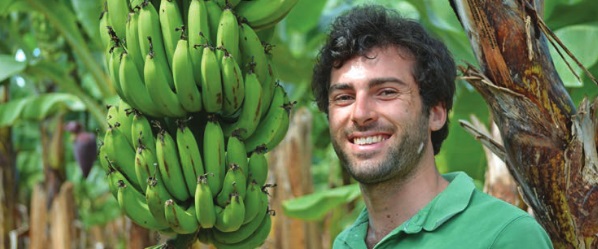
French agriculture student Kévin de Cozar was looking for work experience in tropical crop protection when he came to North Queensland.
Unexpectedly, he got an insight into one of Australia’s biggest crop-protection issues, Panama TR4.
Kévin answers our Life Science questions.
Kévin, why did you choose to come to Australia?
I was studying agriculture at Montpellier SupAgro University and I was interested in plant protection and companies working in bananas and papayas.
When I started looking online, I found Richard’s company (North Queensland agronomist Richard Piper from Scientific Advisory Services).
How long do you have to go with your studies?
I had a gap year and spent three months in North Queensland working with Richard. It’s a three-year course. I still have one year left now that I’m back in France.
What was the main thing you learned in North Queensland?
I basically learned everything about tropical crops, that’s something that interests me. In France I’ve been working with temperate-climate crops.
I think things worked out really well, I think I was able to help Richard with some of the different things he does in his work.
What banana-science issue did you look at?
I looked at the issue of lightning strikes in bananas. I put it in context with TR4, the symptoms can be quite similar.
Tell us about your involvement in part of the TR4 response?
That was quite an accomplishment for me. I was asked if I wanted to volunteer to go and help with killing the infected plants. I worked with ABGC officer Louis Lardi (Kévin worked with Louis to destroy the first patch of banana plants confirmed to have TR4 in the Tully Valley after the destruction was ordered by Biosecurity Queensland).
Doing the work was something unexpected. But of course I had heard about this issue with Panama. It’s something that taught me a lot. I was glad that I could help and be a part of it.
What’s some of the differences between farming in North Queensland and Western Europe?
The way the work is managed in North Queensland is quite different, you have big farms and a lot of workers around.
I think that’s the biggest difference. In France you have big farms for cereals, for wheat and corn, but for the rest you have a lot of small farms and processing done on the farms.
The farmers also have a different way of working. The hours are different too, depending on the farms.
I don’t think they would start as early in Western Europe as they do in North Queensland, but they would finish later.
And some of the similarities?
There are similarities between the farmers in both places.
They’re all really close to the land, they know a lot about their surroundings and they’ve been on their farms for a long time, so they know the history of their land and all around.
And I think the organisation of the work on all the farms and the use of consultants is all the same.
What area of agriculture do you think you will work in?
The things that I’m learning will be relevant to any type of agriculture. When you work with different issues you can always make links with other crops. I’m not really decided on what sort of crops I want to work on later, but I’m open for anything. If I want to, I can go to tropical parts of France in the Caribbean to work with crops there.
